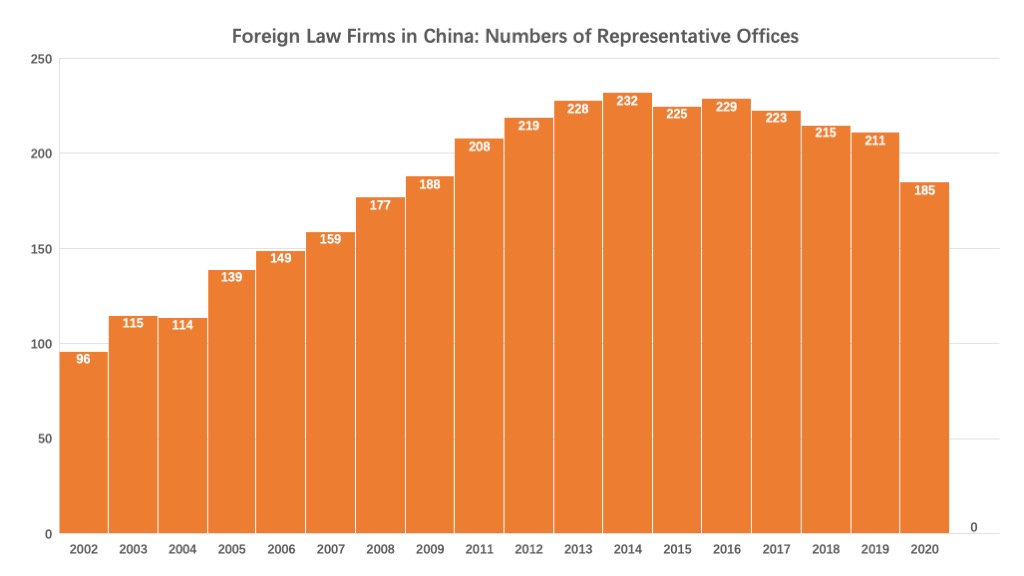
Foreign law firms started to explore China’s legal market in 1992. After a 12-year rapid growth period started in 2002, they gradually declined from their peak in 2014.
Key takeaways:
- In 1992, 12 foreign law firms were approved by China’s government to establish representative offices in China.
- The number of foreign law firms’ representative offices in China increased rapidly from 96 in 2002 to 232 in 2014, showing a continuously growing trend though with some occasional drops in a few years. In this period, it was in line with the growth rate of foreign investment in China. Elite lawyers from all over the world also entered China along with foreign investors.
- The number of representative offices of foreign law firms in China declined from the peak of 232 in 2014 to 185 in 2020. The gradual decrease is attributable to various factors, including less active cross-border investment, limited service scope of foreign law firms, and rapid development of China's local lawyers.
Foreign law firms started to explore China’s legal market in 1992. After a 12-year rapid growth period started in 2002, they gradually declined from their peak in 2014.

The above statistics are collected by the Ministry of Justice of China, among which the data for 2010 is not available.
I. Foreign law firm’s initial entry in China: 1992-2001
In 1992, 12 foreign law firms were approved by China’s government to establish representative offices in China. Prior to this, some foreign law firms had started to provide foreign-related legal services in China in the form of foreign trade consulting agencies.
On 26 May 1992, the Ministry of Justice and the previous State Administration for Industry and Commerce jointly issued the “Interim Provisions on the Establishment of Representative Offices in China by Foreign Law Firms” (the ”1992 Provisions”, 关于外国律师事务所在中国境内设立办事处的暂行规定). Under the 1992 Provisions, foreign law firms are allowed to establish only one representative office in 19 cities, including Beijing, Shanghai, and Guangzhou.
This is the first time that China officially allowed foreign law firms to establish offices in the country.
Thereafter, the number of representative offices of foreign law firms in China increased from 12 in 1992 to 96 in 2011.
On 19 Dec. 2001, the State Council adopted the “Administrative Regulations on the Representative Offices of Foreign Law Firms in China” (the "2001 Regulations", 外国律师事务所驻华代表机构管理条例). The 2001 Regulations lifts the restrictions on foreign law firms to establish representative offices in terms of numbers and locations, further facilitating the access for foreign law firms to China’s market.
Thereafter, foreign law firms entered a period of rapid growth.
II. Rapid growth of foreign law firms: 2002-2014
From 2002 to 2014, foreign law firms in China entered a period of rapid growth, which reached its peak in 2014.
The number of foreign law firms’ representative offices in China increased rapidly from 96 in 2002 to 232 in 2014, showing a continuously growing trend though with some occasional drops in a few years.
In this period, it was in line with the growth rate of foreign investment in China. Elite lawyers from all over the world also entered China along with foreign investors.
In cities such as Beijing, Shanghai and Guangzhou, foreign law firms have cornered the market in cross-border legal practice and high-end commercial legal practice.
III. Decrease of foreign law firms year by year: 2014-2020
The number of representative offices of foreign law firms in China declined from the peak of 232 in 2014 to 185 in 2020. Such figure is less than that in 2009, the number of which was 188.
The gradual decrease is caused by the combination of the following factors:
1. Less active cross-border investment
In recent years, China's actual use of foreign investment has slowed down. And China's outbound direct investment has been gradually declining since 2016. The decline in the number and value of cross-border transactions has directly impacted the cross-border legal market.
In addition, in the past three years, China's international relations have been adjusting, and, the COVID-19 pandemic occurred and spread worldwide.
This has also affected the development of foreign law firms in China.
2. Limited service scope of foreign law firms
Although the 2001 Regulations lifts the restrictions on foreign law firms to establish representative offices in China in terms of numbers and locations, the scope of legal services provided by such foreign law firms has been strictly limited.
As a result, foreign law firms are not able to expand smoothly.
For example, foreign law firms are not allowed to employ licensed Chinese lawyers, and their employees are not allowed to provide legal services for their clients.
Foreigners cannot qualify as lawyers in China and therefore cannot practice Chinese law.
Foreign lawyers cannot participate in litigation as lawyers in Chinese courts and can only participate in some international arbitration. In addition, its service scope is mainly limited to IPO, mergers and acquisitions, compliance, foreign investment, and other commercial business.
3. Rapid development of China's local lawyers
At the same time, Chinese law firms have developed rapidly in the past decades. Not only are they improving their ability to provide legal services in China, but they are also catching up with foreign law firms in providing services in cross-border legal matters.
These Chinese firms are gradually gaining market share from foreign law firms.
For example, by the end of 2020, there were 8,588 Chinese lawyers who had received education and obtained academic degrees abroad, and Chinese law firms had set up more than 150 branches abroad, handling more than 93,000 legal affairs.
In addition, some Chinese law firms started to enter the international legal market by establishing branch offices overseas or joining or forming cross-border law firm alliances, providing one-stop-shop legal solutions to clients both in China and overseas.
Contributors: Guodong Du 杜国栋









